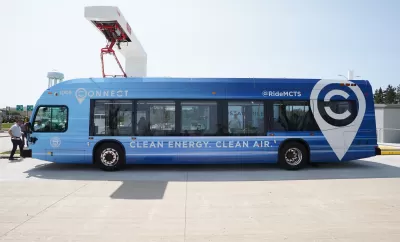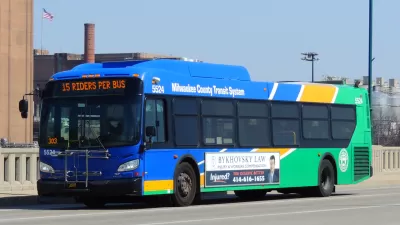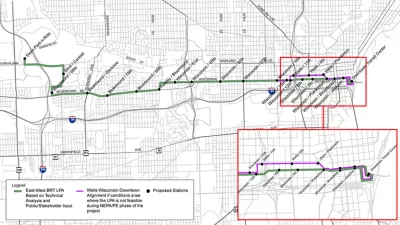The newly opened line is already reaching pre-pandemic ridership levels.

Milwaukee’s newest bus rapid transit (BRT) line is bringing transit riders back to the Milwaukee County Transit System (MCTS), reports Graham Kilmer in Urban Milwaukee, with an average of 2,800 riders per day—slightly more than 2019 ridership on the same corridor, pre-BRT.
Achieving pre-pandemic ridership levels is an achievement for any transit agency, as numbers continue to stagnate on many of the nation’s biggest systems. “Since MCTS began designing the new service it has estimated that by 2035 Connect 1 will average approximately 9,500 riders a day.”
Kilmer adds that “Since launching, the top destinations along the Connect 1 have been Downtown Milwaukee (700 rides per day), Marquette University (500 rides per day) and the Milwaukee Regional Medical Center (200 rides per day).” Connect 1 is also the first line in the system to use Battery Electric Buses (BEB), with “clean-diesels” serving as backup for peak times.
Rides on Connect 1 are free through the end of September.
FULL STORY: BRT Line Records Big Ridership Numbers

Maui's Vacation Rental Debate Turns Ugly
Verbal attacks, misinformation campaigns and fistfights plague a high-stakes debate to convert thousands of vacation rentals into long-term housing.

Planetizen Federal Action Tracker
A weekly monitor of how Trump’s orders and actions are impacting planners and planning in America.

In Urban Planning, AI Prompting Could be the New Design Thinking
Creativity has long been key to great urban design. What if we see AI as our new creative partner?

King County Supportive Housing Program Offers Hope for Unhoused Residents
The county is taking a ‘Housing First’ approach that prioritizes getting people into housing, then offering wraparound supportive services.

Researchers Use AI to Get Clearer Picture of US Housing
Analysts are using artificial intelligence to supercharge their research by allowing them to comb through data faster. Though these AI tools can be error prone, they save time and housing researchers are optimistic about the future.

Making Shared Micromobility More Inclusive
Cities and shared mobility system operators can do more to include people with disabilities in planning and operations, per a new report.
Urban Design for Planners 1: Software Tools
This six-course series explores essential urban design concepts using open source software and equips planners with the tools they need to participate fully in the urban design process.
Planning for Universal Design
Learn the tools for implementing Universal Design in planning regulations.
planning NEXT
Appalachian Highlands Housing Partners
Mpact (founded as Rail~Volution)
City of Camden Redevelopment Agency
City of Astoria
City of Portland
City of Laramie





























